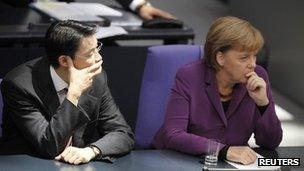Deadlock in the eurozone
- Published
- comments

Angela Merkel (right) and her economy minister have promised to limit the German contribution
Having promised a comprehensive plan to fix the eurozone crisis this weekend, Europe's leaders are in disarray.
We are told that the European summit on Sunday has been downgraded. It will not take the key decisions. They will now be taken at another summit - not later than Wednesday next week, according to the French. How they can be sure that a deal that is elusive at the weekend can be delivered early next week is not easy to understand.
There were discussions to postpone the summit altogether but it has already been put back once and the French were insisted on the meeting.
Despite dashes to Frankfurt by President Nicolas Sarkozy, France and Germany are not in agreement. The meeting was testy. The French president - despite the good news that his wife Carla had had a baby - was grim-faced.
The two leaders may well meet again this weekend before the summit. The French leader has been piling the pressure on Angela Merkel warning that "Europe has a rendezvous with its history".
She has pointed out that "we live in democracies and have to operate according to fundamental rules".
This crisis has underlined that the EU, in large part, remains a Franco-German union. The other members of the eurozone appear as bystanders whilst the French and German leaders determine the fate of their currency.
Boxed in
The main sticking-point remains how to increase the firepower of the eurozone's main bailout fund, the European Financial Stability Facility (EFSF).
It already has a pot of 440bn euros ($595bn; £383bn) although that amount has been depleted by helping Portugal and Ireland and it will be depleted further by the the second Greek bailout.
It is nowhere big enough to provide an umbrella for a country as big as Italy if that country needs rescuing. Most analysts believe that Italy and Spain can only be safe-guarded if the facility can call on 2tn euros.
Both Germany and France are boxed in. The French cannot take on more commitments without risking losing their triple AAA rating. The German government has given an undertaking to its tax-payers that its contribution will not go above 211bn euros. That was underlined again on Friday by the German Economy Minister, Philip Roesler.
All kinds of options have been considered. The French wanted the fund to become a bank so it could borrow from the European Central Bank (ECB). The Germans have ruled that out.
Others suggested using the fund to offer insurance on government bonds but that, of course, carries the risk that tax-payers could be exposed to a large bill. Others have argued for using the fund to provide direct guarantees to countries in difficulty but that probably violates EU treaties.
So a search is under way to increase the size of the fund without increasing the liabilities of German taxpayers.
But if this is the main sticking point, agreement elsewhere is elusive.
Toll on Greece
The EU has not yet explained what its plans are for Greece. The Greek parliament approved the new austerity measures yesterday and Greece will get the next tranche of bailout money to tide it over, but this is a mere band-aid.
The agreement by the troika (the EU, the IMF and the ECB) is a fudge. Not only has Greece failed to reach its targets for reducing the deficit but, as the Financial Times reports, it believes that social unrest and industrial action are taking a toll on the economy.
The current situation is unsustainable. The economy is shrinking and tax revenues are down. Greece's debt mountain continues to grow. The head of Germany's second-largest bank, Commerzbank, Martin Blessing says Greece should declare itself insolvent and then restructure its debt.
At the meetings this weekend European leaders will discuss how to reduce Greek debt by forcing investors to take further losses (a hair-cut).
The banks and other investors had agreed in July to take a hit of 21% by postponing the dates they would get their funds back. The aim now is to get these investors to take a 50-60% hit.
But even here there are difficulties and disagreements. The banks may not play ball. The French worry that too big a loss would trigger what is called a "credit event", opening up all kinds of claims for compensation that might unsettle the international financial system.
The wider concern is, of course, what impact any Greek default would have on Europe's banks. Everyone agrees that the banks need strengthening but by how much?
The IMF says more than 200bn euros are needed. Others say more. The trickier question is where the money will come from. Ideally it would come from the banks themselves.
Tapping taxpayers - when the banks are so unpopular - would prove politically hard to sell and the banks are warning that if they boost their capital it will dent their ability to lend.
Beyond all this there are two other concerns. Both the Spanish and Italian economies have little to no growth. Unemployment is stubbornly high. It is not clear where the growth will come from to pay down their debts.
And even with those countries in the emergency ward - like Greece and Portugal - how will they climb back to financial health whilst they are cutting spending in the midst of a recession?
Last weekend Angela Merkel warned against expecting a "big bang" to solve this crisis. She was right. The eurozone crisis is complex and divisive.